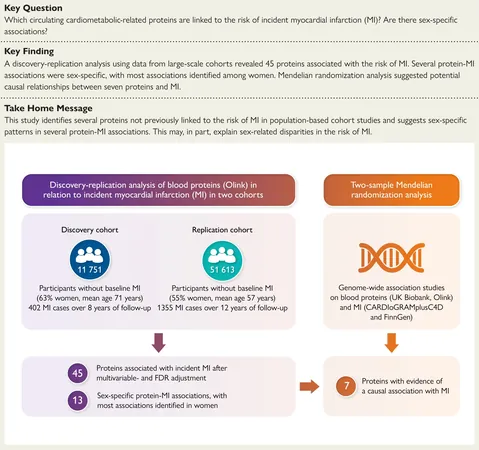
Breakthrough Discovery: How Sex-Specific Proteins Could Transform Heart Attack Prevention!
2024-10-30
Author: Nur
Groundbreaking Discovery by Researchers
Researchers at Uppsala University and Karolinska Institutet have made a groundbreaking discovery in the fight against heart disease, identifying 45 proteins in the blood that could reveal why heart attack risks vary between genders. This significant finding could pave the way for more personalized and effective approaches to cardiovascular health.
Sex-Specific Proteins Identified
Among the 45 identified proteins, 13 were found to be specifically linked to women, whereas only one protein presented a specific association for men. This highlights the potential for sex-specific biological mechanisms that influence the risk of myocardial infarction (MI), commonly known as a heart attack. Understanding these differences could transform prevention strategies and treatment methods for heart disease, which remains the leading cause of premature death around the globe.
Traditional Risk Factors vs Molecular Pathways
While traditional risk factors, such as diabetes, hypertension, and smoking, have long been recognized, the intricate molecular pathways that influence MI risk have remained largely elusive. The disparity in heart attack risk between men and women has sporadically been documented, but the reasons behind these differences have not been thoroughly explored—until now.
Publication and Research Methodology
The researchers published their findings in the prestigious European Heart Journal, in a paper that delves into the role of circulating proteins and how they correlate with MI risk. This research utilized data from two comprehensive cohorts: one comprising 11,751 Swedish adults aged between 55 and 93, and a replication cohort from the UK Biobank, involving 51,613 participants.
Key Findings on Protein Levels and MI Risk
Through meticulous blood sample analyses using Olink proximity extension assays—designed to investigate cardiometabolic health—the team monitored participants over eight years for incidents of MI and mortality, linking their findings to national health registers.
Association of Protein Levels with Heart Attacks
The results indicated that higher levels of proteins such as renin, follistatin, and retinoic acid receptor responder protein 2 were significantly associated with an increased risk of heart attacks, while elevated levels of tissue factor pathway inhibitor, tumor necrosis factor receptors 1 and 2, and placenta growth factor correlated with a reduced risk. The study suggests that pathways related to atherosclerosis, thrombosis, inflammation, and immune response play pivotal roles in developing MI.
Understanding 'Yentl Syndrome'
Adding depth to their findings, the research team incorporated commentary from A. K. Barton and colleagues, who revisited the concept of "Yentl syndrome." This term, coined in 1991 by Bernadine Healy, former Director of the National Institutes of Health, underlined the stark disparities faced by women with ischemic heart disease. It’s a critical reminder that understanding these sex-specific differences is essential—not just for the sake of equity, but for improving outcomes for everyone.
Implications for Clinical Studies and Future Research
As one of the first studies to assess circulating proteins alongside sex-specific differences in MI risk within large, population-based cohorts, this groundbreaking research underscores the necessity of including both genders in clinical studies. Only by doing so can we hope to fully comprehend and address the intricacies of cardiovascular health differences between men and women.
Toward a More Tailored Approach to Heart Health
With a clearer understanding of the proteins involved, this study propels us toward a future where heart attack prevention can be tailored not just to the individual’s health background, but also to their biological sex—potentially saving countless lives in the process! Stay tuned for more updates on this revolutionary research!

 Brasil (PT)
Brasil (PT)
 Canada (EN)
Canada (EN)
 Chile (ES)
Chile (ES)
 España (ES)
España (ES)
 France (FR)
France (FR)
 Hong Kong (EN)
Hong Kong (EN)
 Italia (IT)
Italia (IT)
 日本 (JA)
日本 (JA)
 Magyarország (HU)
Magyarország (HU)
 Norge (NO)
Norge (NO)
 Polska (PL)
Polska (PL)
 Schweiz (DE)
Schweiz (DE)
 Singapore (EN)
Singapore (EN)
 Sverige (SV)
Sverige (SV)
 Suomi (FI)
Suomi (FI)
 Türkiye (TR)
Türkiye (TR)